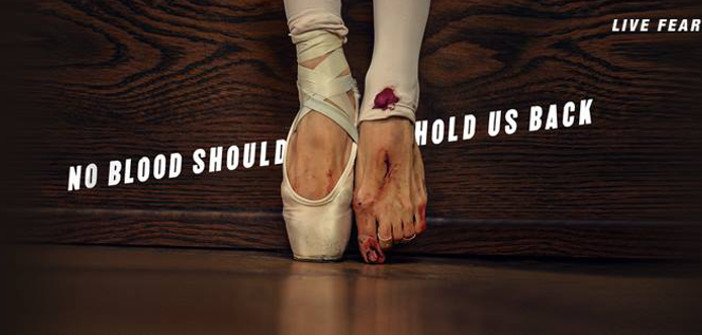‘No Blood Should Hold Us Back’: Periods, Pads, & Pushing Stigma Aside
Last week, British feminine hygiene company Bodyform released an advert promoting their range of period pads and pantyliners. It showed women engaging in a number of sports and strenuous activities like rugby, mountain climbing, ballet, and boxing, pushing their bodies to the limit and affirming that, yes: women on their periods can get shit done too. But unlike any other menstrual-based ad, Bodyform’s did something the others before it had apparently been too scared to – it showed blood.
Bruises, cuts, gashes, wounds; the ad shows it all. And there’s not a blue liquid, suspiciously stain-free white pair of jeans, or weird out-dated suggestion that women on their periods are just crazy! in sight. Instead, there’s a lot of different women doing a lot of different things. There’s a lot of bodies being pushed as far they can physically go, a lot of strength, and a whole lot of blood. The ad rejects the impractical, yet still dominant, idea that even during your time of the month you can be as fresh as a daisy, and chooses to present something a little more realistic. Periods are messy, but even so: “No blood should hold us back.”
[youtube id=”8Q1GVOYIcKc” align=”center” mode=”normal” autoplay=”no” maxwidth=”750″]
The ad is a part of Bodyform’s Red.fit programme – a campaign designed to provide more information about the menstrual cycle and how it affects our day to day lives, and also to encourage women to continue exercising during their period. According to the company, women have been grossly underrepresented in sport and exercise research studies. Over 40% of regularly active women report that their periods negatively affect their training plan, and yet, there is little or no research readily available to understand why.
The Red.fit programme have teamed up with various universities and companies who are currently investing in research specifically focused on menstruation. This is important for a number of reasons. One relates directly to Bodyform’s Red.fit campaign, in that more studies on periods leads to more ways to ensure that women can continue to be active no matter what time of the month it is. Another is because there exists a serious lack of medical research pertaining specifically to the female body – or any body, really, that isn’t able, white, cis, and male.

The idea that periods are a taboo subject – something not to spoken of unless through ambiguous metaphors, lauded with shame and a strong sense of feminine distrust – doesn’t really apply to 21st century Ireland. At least not to women. Our sex ed classes may need a little bit of an (or total) overhaul, and the female body might still exist unjustly in the constitution, but as it stands, we seem pretty ready to talk openly and frankly about our bodies. Even if no one else wants to.
Though this wasn’t always the way things were. Menstruation used to be shrouded in mystery; an unspoken event that essentially meant very little other than you had finally ‘become a woman.’ The word ‘period’ wasn’t even said on TV until 1984 unless a couple of Americans happened to be talking about full stops. Before Courtney Cox’s Tampax advert that year, euphemisms dominated discussions of menstruation. ‘Time of the month,’ ‘Aunt Flo,’ ‘the postman,’ ‘the visitors,’ ‘surfing the crimson wave’ – we’ve heard them all, and we still do.
[youtube id=”kOHCtQfFn7E” align=”center” mode=”normal” autoplay=”no” maxwidth=”750″]
Luckily, we’ve also got tonnes more people willing to talk about periods, programmes like Red.fit actively engaging in menstruation research, and shows like Broad City dedicating whole episodes to what happens when your period shows up unexpectedly and you’re stuck on a plane to Israel with a few rabbis and no tampons. But we live in the West, where the majority of us have access to things like sex education and feminine hygiene products. In places like India, Indonesia, and many African countries, women are not so fortunate.

In 2013, research in India found that over 23% of young girls were forced to drop out of school upon reaching puberty due to a lack of facilities. Not only are sanitary towels too expensive for a lot of girls to purchase every month, but many schools do not even have functioning toilets. According to AC Nielson and NGO Plan India, those who stay in education are still missing up to 50 days of school every year because of their periods.[pullquote]In 2013, research in India found that over 23% of young girls were forced to drop out of school upon reaching puberty.[/pullquote]
In Uganda, young girls are regularly exposed to misinformation regarding menstruation. Myths such as having sex while on your period will stop any discomfort you might be experiencing, as well as superstitions like a menstruating woman walking through your garden will kill all of your plants, are shared over and over to enhance the stigma associated with menstruation.
German organisation WASH (Water, Sanitation & Hygiene) United have been tackling this stigma through Menstrual Hygiene Day. Since 2014, the NGO has attempted to break the various menstrual-related taboos and encourage a healthy worldwide conversation about periods and appropriate menstrual hygiene. The awareness day takes place annually on May 28th due to the fact that the menstrual cycle is 28 days long, and May is the fifth month of the year.

MHD promotes information about the importance of menstrual hygiene, and aims to make talking about – and living with – periods easier for all women. Half of the world’s population will experience menstruation, but as it stands, only two thirds of those have access to a working toilet.
Bodyform’s latest ad is important, it’s bold, and most of all, it’s realistic. Unlike that smiling woman in the white sundress at the end of the tampon ad might suggest, periods aren’t always so simple – but with increased education, research, and access to feminine hygiene products, they shouldn’t have to hold us back.
